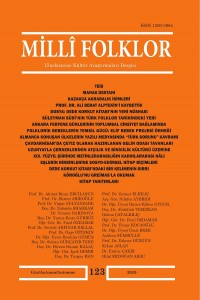Abstract
References
- Akalın, Şükrü Halûk. “Adana’nın Söz Varlığı”. Efsaneden Tarihe, Tarihten Bugüne Adana: Köprübaşı İstanbul: Yapı Kredi Yayınları, 2000: 431-437.
- Bartold, V. V. Kniga Moego Deda Korkuta. Oguzskiy Geroiçeskiy Epos (V. M. Jirmunskiy ve A. N. Kononov, haz.). Moskova-Leningrad: Nauka, 1962.
- Tezcan, Semih. Dede Korkut Oğuznameleri Üzerine Notlar, İstanbul: Yapı Kredi Yayınları, 2001.
Abstract
The article discusses how should one read the word بيلدقدة that appears in the Dresden manuscript (page: 100b, line: 11) of The Book of Dede Korkut. The word, which read differently by different researchers, appears in the following verse in The Story of Kan Turali: ‘Princess Saljan, when you rise up, when you ride the black-maned Kazilik horse, when you dismount at the threshold of my father’s white pavilion, when the chestnut-eyed daughters and daughters-in-law of the Oghuz بيلدقدة when everyone says her say, you will stand there and boast, you will say, “Kan Turali was helpless; I led the way on my horse and he followed after” (trans. G. Lewis). The character of the Dresden manuscript, written without hareke, and the colloquial character of the word in question made it difficult to understand, that is why there are different readings of the word. Some researchers have read the word as boyladuḳda and given the meaning as ‘when they tell their stories’ (O. Ş. Gökyay; M. Ergin; G. Lewis) or as ‘when they listen carefully’ (S. Özcelik). The word has also been read as yığılduḳda ‘when they gather’ (S. Tezcan, M. Kaçalin, G. Pehlivan), bilduḳda ‘when they know’ (F. Zeynalov, S. Alizade), yayladuḳda ‘when they summer’ (V. V. Bartold). The article presents the reasons why these readings are not formally or semantically (or both) acceptable. Particularly, the fact that the subject of the verb is “the daughters and daughters-in-law of the Oghuz”, that is, the verb should be a female action word, was ignored in these readings. Thus, it was necessary to introduce a new reading to understand and interpret the text correctly. It is argued in the article that the word is formed by adding the verb-forming derivational suffix -la with the gerundium suffix -duḳda to the interjection root buy/ bıy, which is generally used by women. The new proposal is supported by arguments that take into consideration the consistence with the written form of the word, its coherence with the context, its integrity with the syntactic environment as an intransitive verb and its semantic agreement with the subject as a female action word.
References
- Akalın, Şükrü Halûk. “Adana’nın Söz Varlığı”. Efsaneden Tarihe, Tarihten Bugüne Adana: Köprübaşı İstanbul: Yapı Kredi Yayınları, 2000: 431-437.
- Bartold, V. V. Kniga Moego Deda Korkuta. Oguzskiy Geroiçeskiy Epos (V. M. Jirmunskiy ve A. N. Kononov, haz.). Moskova-Leningrad: Nauka, 1962.
- Tezcan, Semih. Dede Korkut Oğuznameleri Üzerine Notlar, İstanbul: Yapı Kredi Yayınları, 2001.
Details
| Primary Language | Turkish |
|---|---|
| Subjects | Anthropology, Turkish Folklore, Cultural Studies |
| Journal Section | RESEARCH ARTICLES |
| Authors | |
| Publication Date | September 29, 2019 |
| Published in Issue | Year 2019 Volume: 16 Issue: 123 |
Millî Folklor is licensed under a Attribution-NonCommercial 4.0 International license https://creativecommons.org/licenses/by-nc/4.0/

